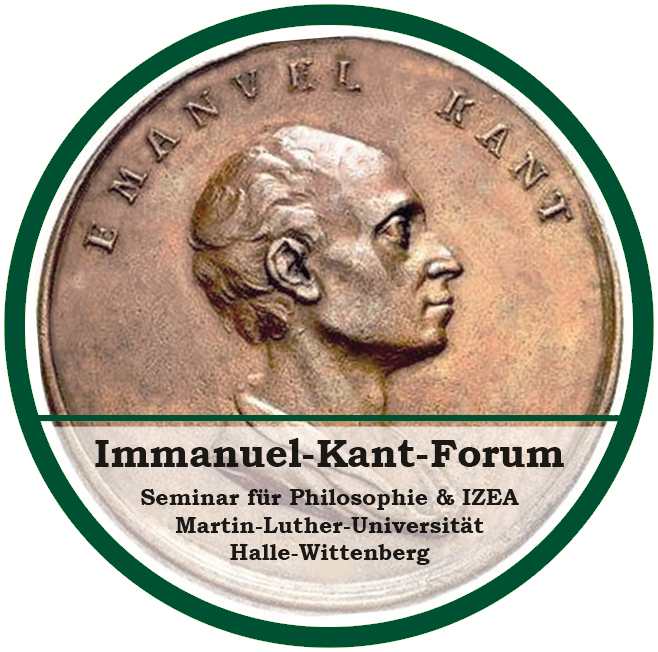Immanuel-Kant-Forum
Chinese – Deutsch – Español – Français – Italiano – Japanese – Korean – PortuguêsCentre for research and international meeting
Guest lecturesWorkshops and conferences
Head:
Prof. Dr. Heiner F. Klemme
Seminar für Philosophie
Martin-Luther-Universität Halle-Wittenberg
D-06099 Halle (Saale)
Email: Heiner.Klemme@phil.uni-halle.de
Academic staff:
Dr. Antonino Falduto
Email: Antonino.Falduto@phil.uni-halle.de
Dr. Gabriel Rivero
DFG-Projekt "Kants Begriff der (Un-)Mündigkeit in historischer und systematischer Perspektive"
Daniel Stader
DFG-Projekt "Kants Begriff der (Un-)Mündigkeit in historischer und systematischer Perspektive"
Dr. Falk Wunderlich
Email: Falk.Wunderlich@phil.uni-halle.de
Guests:
Guests at Immanuel-Kant-Forum
Locations:
Seminar für Philosophie
Emil-Abderhalden-Str. 26/27
06108 Halle (Saale)
Interdisziplinäres Zentrum für die Erforschung der Europäischen Aufklärung (IZEA)
Franckeplatz 1, Haus 54
06110 Halle (Saale)
The main aims of the Immanuel-Kant-Forum (IKF) at the Department of Philosophy (Seminar für Philosophie), Martin-Luther-Universität Halle-Wittenberg, are to foster the scientific study of the philosophy of Immanuel Kant (1724-1804), its prehistory and its historical context, as well as its significance for contemporary scientific and social problems and questions. The focus of the historical work conducted by its members is the period between Christian Wolff (1679-1754) and German Idealism, whereas the systematic focus is both in practical and theoretical philosophy.
The Immanuel-Kant-Forum serves as a place for international, interdisciplinary research and is intended to play a bridging role between the different cultures of Kant research and Kant interpretation that have evolved during the last decades. Special emphasis is placed on supporting early career scholars.
The Immanuel-Kant-Forum also organizes conferences and offers seminars and lectures at the Department of Philosophy in connection with its historical and systematic focus. It supports scholars from abroad in their efforts to gain funding for research and studies-related visits and stays at MLU Halle-Wittenberg. These opportunities are supplemented by the scholarly activities of other research institutions at MLU Halle-Wittenberg, including the „Interdisciplinary Centre for European Enlightenment Studies“ (IZEA), the Center of Excellence „Enlightenment - Religion - Knowledge“ (ARW), the Research Cluster „Society and Culture in Motion“ (SCM), and „Interdisziplinäres Zentrum für Pietismusforschung“ (IZP). The historical and contemporary library holdings at MLU Halle-Wittenberg provide further research opportunities.
The university of Halle-Wittenberg is an ideal location of the IKF. During their long history, the universities of Wittenberg (founded in 1502) and Halle (Saale) (founded in 1694) that were united in the early nineteenth century played an essential role in the establishment of the modern world, in particular during Reformation and Enlightenment. Not the least, this is also true of the intellectual and cultural life at Königsberg that was shaped in important ways by the Halle controversies between Pietism and Rationalism, with the Halle-trained theologian Franz Albert Schultz (1692-1763) as an intermediary. It is hard to imagine Kant’s works without the impact of philosophers and (neologian) theologians who taught at Halle or were educated there. To mention but a few: Christian Wolff, Alexander Gottlieb Baumgarten (1714-1762), Georg Friedrich Meier (1718-1777), Johann Salomo Semler (1725-1791), and Johann August Eberhard (1739-1809). Among Kant’s acquaintances, Friedrich Samuel Bock (1716-1785), Michael Friedländer (1769-1824), Gottlob Benjamin Jäsche (1762-1842), Johann Gottfried Karl Christian Kiesewetter (1766-1819), Georg David Kypke (1724-1779), and Marcus Herz (1747-1803) were students in Halle. From the 650 authors represented in The Dictionary of Eighteenth Century German Philosophers (3 vols., ed. H. F. Klemme snd M. Kuehn, London, New York 2010), more than 20 percent are related to the universities in Halle and Wittenberg in one way or another.
The MLU also has its own, long-lasting tradition, critical and independent to some extent, of reception of and research on Kant’s philosophy, epitomized by, for instance, Ludwig Martin Träger (1743-1772), Christian Gottfried Schütz (1747-1832), Ludwig Heinrich von Jakob (1759-1827), Jacob Sigismund Beck (1761-1840), Johann Heinrich Tieftrunk (1760-1837), Johann Gebhard Ehrenreich Maaß (1766-1823), and Johann Christoph Hoffbauer (1766-1827). This tradition reached its institutional peak with Hans Vaihinger (1852-1933), professor of philosophy, who established the journal „Kant-Studien“ in 1896 and the „Kant-Gesellschaft“ on April 22, 1904 (i.e., on Kant’s 180th birthday) he headed for a few years. The first board of the society included the Halle-based professors Alois Riehl and Rudolf Stammler. The Immanuel-Kant-Forum conceives itself in this tradition of historical and systematic Kant reception and Kant research.
The close connection between Kant and Halle is also obvious from the fact that Kant applied for and received the Imprimatur for the last publication he submitted by himself, the Conflict of the Faculties published in 1798, at the Philosophische Fakultät in Halle, after the Imprimatur was denied at Berlin. Halle is also the place of printing (although not the publishing place) of a few of his most important writings: The publisher Johann Friedrich Hartknoch, based in Riga, had the works published by his house in the 1780s printed in Halle with Grunert, including the Critique of Pure Reason (1781, 1787), the Prolegomena to Any Future Metaphysics That Will Be Able to Present Itself as a Science (1783), the Metaphysical Foundations of Natural Science (1786) and the Critique of Practical Reason (1787/88). In 1790, the Königsberg publisher Friedrich Nicolovius commissioned the publishing house of Johann Jacob Gebauer with printing the polemic against Eberhard, On a Discovery whereby any New Critique of Pure Reason is Made Superfluous by an Older One. Thus from the perspective of its printing history, critical philosophy saw the light of day at Halle an der Saale.




